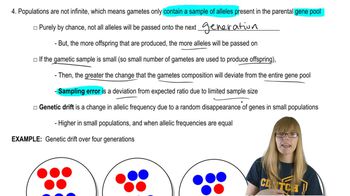Table of contents
- 1. Introduction to Genetics51m
- 2. Mendel's Laws of Inheritance3h 37m
- 3. Extensions to Mendelian Inheritance2h 41m
- 4. Genetic Mapping and Linkage2h 28m
- 5. Genetics of Bacteria and Viruses1h 21m
- 6. Chromosomal Variation1h 48m
- 7. DNA and Chromosome Structure56m
- 8. DNA Replication1h 10m
- 9. Mitosis and Meiosis1h 34m
- 10. Transcription1h 0m
- 11. Translation58m
- 12. Gene Regulation in Prokaryotes1h 19m
- 13. Gene Regulation in Eukaryotes44m
- 14. Genetic Control of Development44m
- 15. Genomes and Genomics1h 50m
- 16. Transposable Elements47m
- 17. Mutation, Repair, and Recombination1h 6m
- 18. Molecular Genetic Tools19m
- 19. Cancer Genetics29m
- 20. Quantitative Genetics1h 26m
- 21. Population Genetics50m
- 22. Evolutionary Genetics29m
15. Genomes and Genomics
Functional Genomics
Problem 17c
Textbook Question
Textbook QuestionMetagenomics studies generate very large amounts of sequence data. Provide examples of genetic insight that can be learned from metagenomics.
 Verified Solution
Verified SolutionThis video solution was recommended by our tutors as helpful for the problem above
Video duration:
1mPlay a video:
Was this helpful?
Key Concepts
Here are the essential concepts you must grasp in order to answer the question correctly.
Metagenomics
Metagenomics is the study of genetic material recovered directly from environmental samples, allowing researchers to analyze the collective genomes of microorganisms in a given habitat. This approach bypasses the need for culturing organisms in the lab, enabling the exploration of microbial diversity and function in various ecosystems, such as soil, oceans, and the human gut.
Microbial Diversity
Microbial diversity refers to the variety of microorganisms present in a specific environment, including bacteria, archaea, viruses, and fungi. Understanding microbial diversity is crucial for insights into ecosystem functioning, as different species can play unique roles in nutrient cycling, disease prevention, and environmental resilience.
Recommended video:
Guided course

Genetic Drift
Functional Genomics
Functional genomics involves studying the functions and interactions of genes and their products within an organism or community. In metagenomics, this concept helps researchers identify genes associated with specific metabolic pathways, antibiotic resistance, or symbiotic relationships, providing insights into how microbial communities adapt and thrive in their environments.
Recommended video:
Guided course

Functional Genomics

 8:26m
8:26mWatch next
Master Functional Genomics with a bite sized video explanation from Kylia Goodner
Start learningRelated Videos
Related Practice

